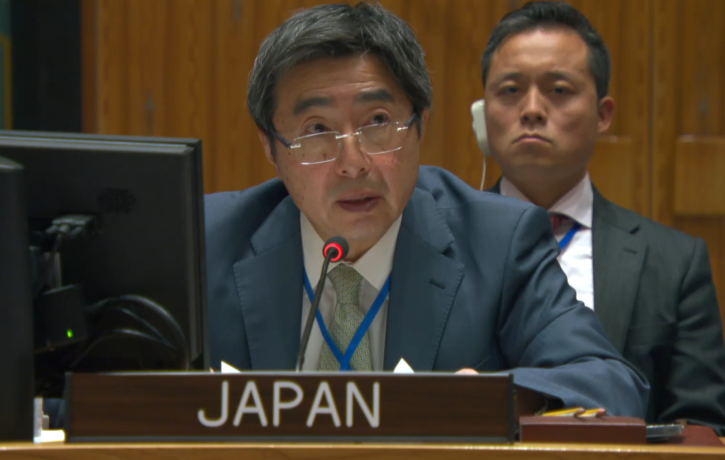Statement by H.E. Ambassador ISHIKANE Kimihiro, Permanent Representative of Japan to the United Nations, at the United Nations Security Council Open Debate “Peace through Dialogue: the Contribution of Regional, Sub-regional and Bilateral arrangements to the Prevention and Peaceful Resolution of Disputes”
2023/10/20

(As delivered)
Mr. President,
I thank ASG Khiari, former President Bachelet, former President Mbeki, and Ms. Alvarez for their briefing.
The world is in turmoil with a series of severe geopolitical challenges including the ongoing aggression against Ukraine, the increasingly tense situation surrounding the Gaza Strip, repeated launches of ICBMs by North Korea, and political unrest in several countries in Africa, to name just a few. These are seriously affecting international peace and security.
In order to cope with such varied and complex crises, it is imperative for the international community to stay united and mobilize every single tool available at hand. In this sense, measures under Chapter VI of the United Nations Charter – ways and means for pacific settlement of disputes including negotiation, mediation, arbitration, judicial settlement, and resort to regional arrangements – are important and should be fully exploited.
Bilateral/regional/sub-regional arrangements are formed based on mutual trust and common interest among parties, with shared affinity and geographic specificity, aiming at resolving regional issues through dialogue. Indeed, we appreciate that these arrangements play an important role in addressing issues in each region. Those may include the AU and IGAD for Somalia, ECOWAS for West Africa and SADC for South Africa, ASEAN, the EU for Europe, OAS for Americas, and others. We should encourage further utilization of such important mechanisms to cope with local challenges and beyond. In this context, the role of the Peacebuilding Commission (PBC) needs to be emphasized as a platform to strengthen partnerships with various actors including regional organizations, sharing best practices and lessons learnt across regions.
On the other hand, there remain some challenges where sufficient confidence among countries does not exist, therefore no or little dialogue happens, or dialogue fails, and regrettably, obligations under international law, including those stemming from Security Council resolutions, have not been respected time and again.
Furthermore, since today’s crises are often interconnected, an incident in one region tends to have a global impact. This is why the United Nations, especially the Security Council, should work together with regional organizations to tackle common challenges. The UN and regional arrangements must not be mutually exclusive, but rather complementary, consistent with Chapter VIII of the UN Charter.
The UN is the largest and last bulwark of multilateralism, and can exercise significant convening power around its flag. Facing serious challenges threatening international peace and security, we must not exclude any measure or arrangement we can choose – bilateral, regional, sub-regional, or multilateral. We should keep our options wide open so that we can utilize the right tools at the right time at the right place.
In particular, the Security Council must fulfill its responsibility. Among many options available to the UN, peace operations are an essential tool at its disposal. The effective implementation of their mandates will be possible under unified support by the Council. Enforcement measures by regional organizations function well if they are utilized appropriately. UN sanctions are also a legitimate, effective, and important tool under Chapter VII of the UN Charter if they are used wisely and rigorously.
Mr. President,
We recognize that these are all useful, but ex post, recovery measures. As the New Agenda for Peace stresses, the most important thing is to prevent a crisis from happening in the first place. Upholding the rule of law at both the national, regional and international level will increase predictability, advance economic and social development, and ensure respect for human rights. Building upon such foundations, we must push peacebuilding forward to eradicate the root causes of crises. As we see it, the basic concepts behind initiatives such as the SDGs, Agenda 2030, and human security are all consistent in this regard.
Mr. President,
The current complex, inter-related global challenges we are facing cannot be solved by any one country. They require cooperation and collaboration. In this collective endeavor, every country and group matters, and any arrangement – whether bilateral, regional, sub-regional, or multilateral – can make a difference as long as they act in the spirit of solidarity and in accordance with the UN Charter. We should strive to overcome divisions and differences among us, aiming for a world that cares for human dignity, where vulnerable people can live safely and securely. Japan is fully committed to multilateralism, and we have been and will always be ready to proactively contribute to world peace, security, and prosperity.
I thank you.
